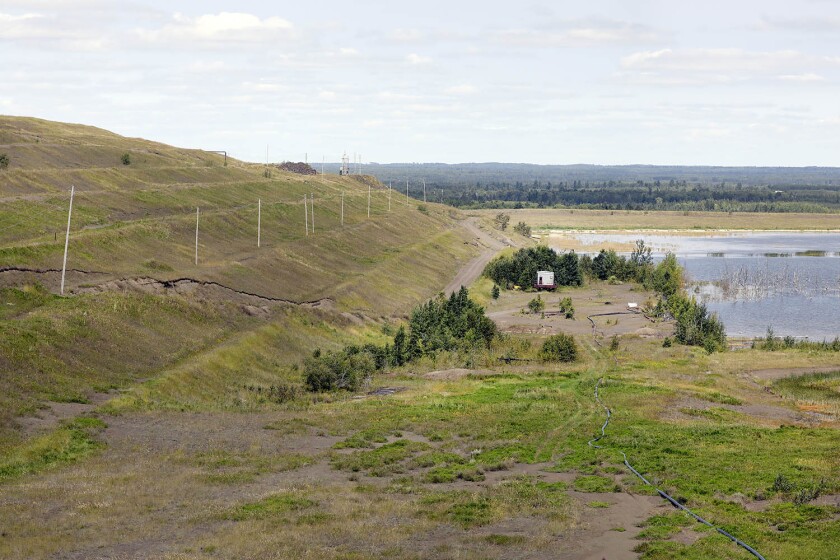DULUTH — The Minnesota Court of Appeals on Monday sent a water discharge permit for PolyMet’s proposed copper-nickel mine back to state regulators to determine whether any releases to groundwater should be federally regulated.
, written by Judge Matthew Johnson, the three-judge panel remanded the project’s National Pollutant Discharge Elimination System, or NPDES, permit back to the Minnesota Pollution Control Agency because the agency originally failed to weigh if the Clean Water Act should apply to pollutants discharged from the project reaching groundwater.
ADVERTISEMENT
The Clean Water Act prohibits the release of pollutants without a permit.
“We conclude that the (Minnesota Pollution Control Agency) erred by not properly considering whether the federal Clean Water Act applies to any future discharges from PolyMet’s facility to groundwater,” Johnson wrote.
Johnson wrote a 2020 decision by the U.S. Supreme Court “clarified that the (Clean Water Act) also applies to discharges of pollutants from a point source to groundwater, if the discharge ‘is the functional equivalent of a direct discharge’ to navigable waters.”
PolyMet is planning an open-pit mine, tailings basin and processing facility near Hoyt Lakes and Babbitt. The mine, which would be the first of its kind for the state, would sit within the Lake Superior watershed.
Plans call for water that seeps from the tailings basin to be captured, treated and released into three creeks that flow, via the Embarrass, Partridge and St. Louis rivers, into Lake Superior.
However, it may not capture everything.
Johnson noted that while PolyMet said there would be no discharges to groundwater, the MPCA’s “record indicates that some underground seepage — even if minimal — is expected.”
ADVERTISEMENT
Though the NPDES is part of the Clean Water Act, a federal law, the state’s MPCA issues and enforces the permit with the Environmental Protection Agency serving in an oversight role.
Most parties in the case considered the decision a victory.
“For a second time, a Minnesota court has firmly decided that the MPCA’s permitting processes for the PolyMet project were rigorous and prudent," Darin Broton, a spokesperson for the MPCA, said in a statement. "While the agency reviews the court’s directive to complete additional analysis that wasn’t required prior to the permit’s issuance, the MPCA appreciates the court’s strong decision that the extensive 479-page water permit for PolyMet is protective of Minnesota’s waters.“
Opponents of the mine were quick to celebrate the decision.
“Once again the courts have rejected a PolyMet permit,” Kathryn Hoffman, chief executive officer of Minnesota Center for Environmental Advocacy, said in a statement. “The agency obviously has more work to do to protect Minnesota's waters and communities from the serious risks of sulfide mining.”
But PolyMet, in a news release, said the court’s decision affirmed six of the seven issues at hand and that the one remaining issue — sending the permit back to the MPCA — wasn’t a big deal.
“This will mean a little more process, but it gives us a clear road map to the reactivation of this permit,” Jon Cherry, chairman, president and CEO, said in the release.
ADVERTISEMENT
Chris Knopf, executive director at Friends of the Boundary Waters Wilderness, said it was “good news” that PolyMet still can’t move forward, but acknowledged several other issues in the decision that the group was considering appealing to the Minnesota Supreme Court.
“There are disagreements and concerns that we have with the Court of Appeals’ decision that we respectfully disagree with,” Knopf told the News Tribune.
by asking the EPA to keep comments on the permit private, but acknowledged such a move was made to prevent comments from reaching the public and leading to "bad press."
Johnson wrote in Monday’s opinion that although the court did not need to determine whether those procedures were lawful, he said “the district court’s key finding bears repeating.”
In his own words, he wrote: “The PCA’s efforts to discourage the EPA from providing written comments during the public-comment period had the purpose and effect of avoiding or minimizing public criticism of the proposed permit and, in addition, avoiding the need for the PCA to publicly respond in writing to the EPA’s comments.”
Separately, by reading the comments over the phone to the MPCA instead of in writing, which kept the comments, including concerns, private.
Additionally, the court said the MPCA did not err in denying a petition by mine opponents calling for a contested-case hearing and said the agency did not err in issuing a permit with “operating limits” to regulate pollutants in the water before being discharged. It also rejected the Fond du Lac Band of Lake Superior Chippewa’s claims that said construction and operation of the mine would damage its water-quality standards. The Fond du Lac Reservation sits 70 miles downstream from the proposed mine site.
ADVERTISEMENT
More than three years after PolyMet received its permits, a number of them remain tied up in legal challenges.
The project’s permit to mine is currently going through a contested-case hearing and the U.S. Army Corps of Engineers is expected to hold a hearing on the project's Section 404 permit, , after the
and insisted any potential mine expansion would not be possible without the company going through the permitting process again when it released additional analysis required by the Court of Appeals. PolyMet characterized the decision as “reactivating” its air permit.
Last week, several environmental groups appealed that decision, asking the Court of Appeals to review it again.
On Saturday, Duluth politicians and environmental group leaders signed a petition asking the state to hold a hearing on the safety of PolyMet’s upstream tailings dam. Signatures included state Sen. Jen McEwen, D-Duluth, and St. Louis County Commissioner Ashley Grimm. Duluth city councilors Roz Rondorf, Gary Anderson, Mike Mayou and Azrin Awal also signed the petition.
Opponents are expected to hold a rally Tuesday at the Minnesota State Capitol to again ask Gov. Tim Walz to “move on” from PolyMet.
This story was updated at 5:28 p.m. Jan. 24 with a statement from Minnesota Pollution Control Agency spokesperson Darin Broton. It was originally posted at 2:16 p.m. Jan. 24.













